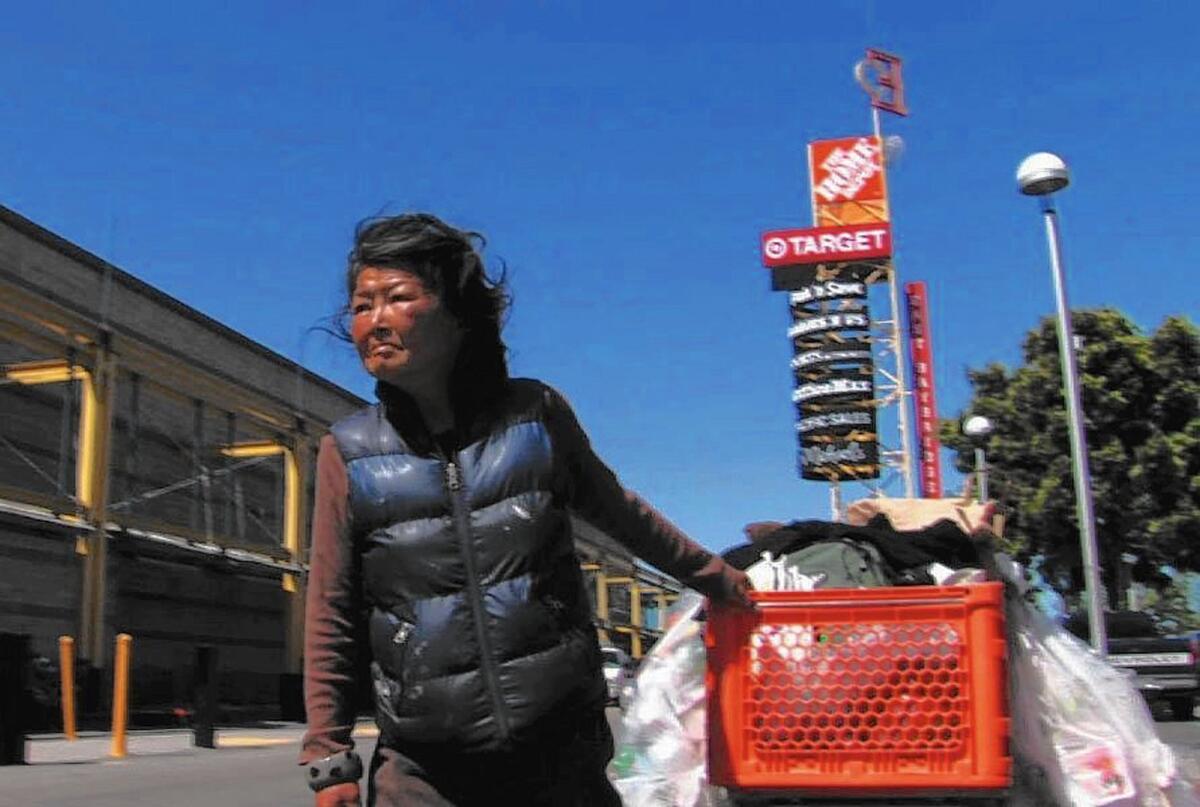Newsletter: Great Reads: A London pub, and California in the ‘50s
Hey there. I'm Kari Howard, and I edit the Great Reads (a.k.a. Column Ones) for the Los Angeles Times.
Two of my biggest loves are narrative journalism and music, and I'm lucky that my days are filled with both: When reading the stories, I get inspired by songs I think fit the article's theme — a soundtrack.
Here are some of the past week's Great Reads, plus their soundtracks.
What do nukes and Persian rugs have in common?
The nuclear standoff between the United States and Iran had an unlikely casualty: Persian rugs. Sellers here in "Tehrangeles," as the enclave of Iranian expats is sometimes called, found their carpets caught up in the clash of diplomats, geopolitics and nuclear brinkmanship. For years, their business has been hurt by the sanctions imposed on Iran. Now that the two countries have reached a deal, they hope it will pave the way for importing rugs once again in what was once Iran's largest foreign market. But this story is much more than the economics of rug sales; it shows us how heritage and childhood memories and artistry are all caught up in the woven wool and silk of the carpets. "This is an art, not just an industry," one seller says. "To me, sanctioning an art is like saying don't bring French paintings to America." One collector says: "This is part of our being. Any Persian house you go in, they'll have one. It's something that's within us."

Alex Helmi is the owner of the rug shop Damoka in Westwood. (Barbara Davidson / Los Angeles Times)
The soundtrack: "It's What You Think," by Persian Rugs. I chose this band purely for their name, but they do some pretty sweet pop. Any regular reader of this newsletter will know I'm a sucker for that.
A fiesta with dancing horses — and a deepening dread of Mexico's drug war
This paper has done hundreds of stories on the drug war in Mexico, most of them from stellar foreign correspondents on that side of the border. This one by Brittny Mejia found a new way to show its ever-deepening dread: through the emotions of immigrants here in Southern California. She spends time with immigrants and their families from the "magical" town of Ocotlan, in the state of Jalisco, which gave the world mariachi music, birria and tequila. Jalisco also has sent perhaps more Mexicans to the United States than any other Mexican state. Most people here have probably never heard of Ocotlan, a city more than 1,500 miles away. But drive L.A.'s freeways and streets, and you might spot a not-unusual sight: a car or truck sporting a sticker bearing its name. For years, Ocotlan was spared the hideous violence of the drug war. But now the shadow of the war hangs over the city loved by so many here in Los Angeles.
An entertainer sings and dances in a La Puente backyard during a festival reminiscent of those held in Ocotlan, Mexico. (Allen J. Schaben / Los Angeles Times)
The soundtrack: "Beneath the City of Dreams," by Calexico. This band's name also fits the story because it unites the two countries. But in this case, the lyrics also fit: a sinister undertow to the city of dreams.
The last days of Miss Kay, and a haunting word: "the unbefriended"
The opening of this story about a homeless woman's last days really moved me. I think it's the detail about the pink elephant: A small, stuffed pink elephant rests in the crook of Hayok Kay's arm. A ventilator tube snakes down her throat. After 61 years, her life has come to this: Bleeding on both sides of the brain. A broken nose, eye socket and ribs. A punctured lung. And, beneath all that damage, cancer. I'm also going to be haunted by the label that's used in medical ethics for those left incapacitated without loved ones who might know their wishes: "the unbefriended." But "Miss Kay," the subject of the story, wasn't alone in her final days. She was broken by loss, but she reached out for love, again and again. I was moved by the story for another reason: This was writer Lee Romney's last Great Read for the Times — in fact, her last story, period. Best of luck to you, Lee.
Hayok Kay, also known as "Miss Kay," on a recycling trip in Oakland. (Amir Soltani)
The soundtrack: "My Sad Captains," by Elbow. I had this on total repeat for most of the editing of the story. Rarely has a song fit a story better. The melancholy, and yet the deep friendship. Elbow's Guy Garvey is such a wonderful lyricist, a burly man who isn't afraid to bare his heart. If you don't know "One Day Like This," you owe yourself a listen to a swoon-worthy song about the everyday joys of love. (Whoever knew that the line "Holy cow, I love your eyes" could be so unspeakably romantic?)
What I'm reading online
The British newspaper the Guardian is committed to long-form journalism, and it has an aptly named feature called "the long read." It's not for those with short attention spans. This story about a pub making a stand against developers in London is one of the longest stories I've read recently. But the writer makes you stay with it until the end because you just have to know what happens to the Golden Lion. Some nice bits of writing here: You can step inside an unfamiliar pub and know immediately, in the belly, that you have made an error. And you can step into another and think: second home. The discovery of a new pub, its signboard thrust out at the intersection of roads and announcing it the Colourful Animal, the Royal’s Body Part, the Two or Three Somethings, can be absolutely elating in a way that is beyond the powers of a Tesco Express. And I like this bit too: And rather in the manner that an ancient general might have kept a flattering portrait of his defeated rival, developers successful in their bids to convert in this way often kept the name of the lost pub for their new apartment blocks. Sometimes they even retained swinging signage outside.
What's on my bedside table
There are more photos than words, perhaps, in "California Surfing and Climbing in the Fifties," but I love how it conjures up the exuberance and optimism of the aptly named Golden State in the mid-century years. The introduction makes me want to get in a time machine and experience this world for myself: The fifties were the easy years in California. With full employment from the Korean War, we were enjoying all the fruits of the fossil fuel culture. Gas was a quarter a gallon, used cars could be bought for twenty-five dollars, campgrounds were free, and you could easily live off the excess fat of society. Those of us in the countercultures of climbing and surfing were, as climber Pete Sinclair said, "the last free Americans." The photos are a dream, and I had a hard time deciding which life I wanted more: that of the surfers, or the climbers.
What's on my turntable
Although I spend most of my time listening with headphones to Spotify, sometimes I want to hear the needle touching down on vinyl. That's why I have a turntable in my office — and two at home (one inside, and a battery-powered one outside when the weather's fine — which it usually is in Southern California). This week's vinyl: "Goin' Places," by the Kingston Trio. It seemed like the right song for a week when many wonderful colleagues left the building and lit out for the territories. (I may have to frame the album sleeve, a charcoal drawing of the Capitol Records building, second only to the LAX Theme Building in my pantheon of great Los Angeles architecture.)
Want to chat? Have a great idea for a Great Read? I'm @karihow on Twitter and kari.howard@latimes.com on email.
